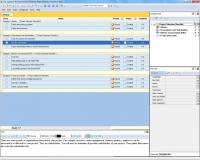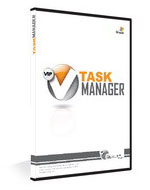|
Task Management Software |
 |
|
|
|
|
| |
|
 TESTIMONIALS TESTIMONIALS
|
|
"...This is an excellent program. I'm so glad that I stumbled on to this when researching for task management programs. Very low learning curv, quite flexible, and the price is right. Tried at least 20 other programs, either too complicated, too expensive, or poor documentation..."
Chad Lindsey -
Honolulu, HI
|
|
|
|
|
|
|
|
Project Selection Checklist |
|
|
|
|
|
|

 |
This Project Selection Checklist highlights important aspects to be considered when selecting and reviewing a project. It will be helpful for people involved in planning and evaluation of new projects. The checklist is best to do with VIP Organizer software.
|
| Order 750 checklists in MS Word and PDF printable format at $49.99 USD only. |
BUY NOW!  |
1. Needs.
- Define the business problem. Every project starts with problem definition. First of all, you need to define a problem that can be addressed by your future project. For instance, a lower sales volume of your company is the problem that you can address by conducting a marketing campaign.
- Define the final result. Along with the business problem you need to determine the outcome of your project, or what product or service will be produced when the project is done. For example, your marketing campaign results in sales increased by 15%. Remember you need to use specific and measurable characteristics to describe the final result of your project.
2. Investments and Stakeholders.
- Look for sources of investments. Successful implementation of your project requires you to make investments. For this purpose you can use your own financial and non-financial resources. Or you can look for external sources of investments. If you can link your expectations to interests of external investors then the project is open to collaboration and partnership. However, remember that in this case you have to share profits and take interests of your investors into account.
- Identify stakeholders. There are some people or organizations interested in your project. For example, investors, senior management, business partners, employees can be interested in or affected by your project. They are stakeholders. You will need to determine all possible stakeholders of your project. Then gather their names into a list (the stakeholder list).
- Define stakeholder interests and involvement level. Now you need to identify interests and involvement level per stakeholder and then design a stakeholder matrix showing how every stakeholder is linked to your project. Such a matrix is used to select the best project that meets all interests of your stakeholders.
3. Return on Investment (ROI).
- Overview. When you’ve defined needs of your project, your next step is to evaluate your return in case the project is successfully done. ROI will be the best indicator of success. The higher ROI you gain, the more successful the project is. Consider the following categories to measure success of your project.
- High-yielding projects with higher ROI. If you define that ROI of your project is not less than 60% per accounting period (e.g. per month), the project is regarded as high-yielding. However, such a project is likely to involve a greater portion of risks and short-term goals so be sure the project will meet your needs.
- Average-yielding projects with moderate ROI. If you think your project brings a 15-50% return of invested resources then such a project will be average-yielding. Middle-term goals and moderate risks will be specific to your project.
- Low-yielding projects with lowered ROI. If ROI of your project is expected to be up to 15% per accounting period then the project will be low-yielding with long-term goals and minimized risk occurrence.
4. Team and Leader.
- Define skills and knowledge requirements. There should be some ...
| Order 750 checklists in MS Word and PDF printable format at $49.99 USD only. |
BUY NOW!  |
|





 |
CentriQS Tasks Management Solution 
Looking for multi-user task management software? Try CentriQS complete task management solution for planning, tracking and reporting tasks, projects, and schedules. Increase productivity of your small business or office by better organizing your employees' tasks and time.
 FREE Download CentriQS FREE Download CentriQS
|
|
|
|
|
|
|
|
|
|
CentriQS  -15% OFF -15% OFF |
All-in-one business management software
for small and midsize enterprises |
 |
|
|
| VIP Task Manager |
Multi-user project management software
to plan, schedule and track project tasks. |
 |
|
|
| VIP Checklists
|
More than 750 ready-to-use to-do lists
to plan your personal and business life |
 |
|
|
| VIP Team To Do List |
Professional task management software
to make and send team todo lists by email |
 |
|
|
| VIP Organizer |
Personal time management software
to organize time at home and at work |
 |
|
|
| VIP Simple To Do List
|
Simple and effective to-do list software
to plan daily chores, trips, wedding, etc. |
 |
|
|
|
|
|
|
|